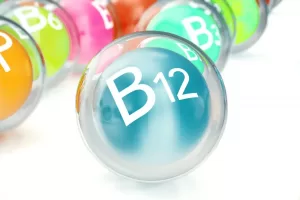Vitamin B12 deficiency- causes, symptoms & treatment of low B12
What are B vitamins? Are you getting enough Vitamin B12?
Vitamins are substances that occur naturally in food, and are needed for many essential body functions. There are 13 vitamins required by our body- and 8 of these are types of Vitamin B. The B Vitamins have a wide variety of important roles in the body, particularly in relation to growth, repair and energy production. Whilst most healthy people who eat a broad and balanced diet will get enough B vitamins from their food, you can become deficient (low) in these vitamins for a variety of reasons.
You can develop low B12 if there is not enough of it in your diet, if you’re unable to absorb the vitamin properly, or if your body is using it up more quickly than usual (e.g. in pregnancy).
What does Vitamin B12 do?
Vitamin B12 (also known as Cobalamin) is important in the production of myelin- a protein which coats your nerves, and forms an “insulating layer”, allowing messages to travel efficiently from your brain and spinal cord to other parts of your body. Vitamin B12 also has vital roles in brain function, making blood cells, DNA production and energy production in your body
How much Vitamin B12 do you need?
The recommended dietary allowance (RDA) of Vitamin B12 is 2.4 mcg/day, though slightly more is needed by women who are pregnant (2.6mcg) or breastfeeding (2.8mcg). Dosages for babies and children are as follows:
- Infants up to 6 months: 0.4 mcg per day
- Babies from 7-12 months: 0.5 mcg per day
- Children from 1-3 years: 0.9 mcg per day
- Children from 4-8 years: 1.2 mcg per day
- Children from 9-13 years: 1.8 mcg per day
What are good sources of B12?
- You can get B12 in meat, milk, eggs, cheese, yeast extracts and fortified breakfast cereals
- B12 is the only vitamin not found in vegetables
- You can also get B12 supplements in tablet form in pharmacies, although people with low B12 who have problems absorbing the vitamin may need to see a doctor to discuss B12 injections instead.
What causes low Vitamin B12?
It’s not always clear why some people get low B12. It is seen more commonly in older people. If you have one of the following issues, it may be causing your low B12:
- Low B12 intake in your diet- e.g due to a vegetarian or vegan diet
- Pernicious Anaemia- an autoimmune condition which results in poor absorption of Vitamin B12 by the stomach
- A side effect of the contraceptive pill
- Other medications you take, such as certain diabetes medicine, and certain antacids.
- Chronic Alcoholism
- Pancreatic failure
- Pregnancy ( as the body is using up more Vitamin B12 than usual)
- Babies born to mums who have low B12 or who are vegan
- Coeliac disease
- A history of surgery on the stomach or small bowel
- Inflammatory bowel disease (such as Crohn’s disease)
- Blind loop syndrome or small bowel bacterial overgrowth
- Infection with fish tapeworm (more common in countries where raw fish is widely eaten)
What are the symptoms of low B12 ?
Mild B12 deficiency may cause you no obvious health issues, but as it gets worse, you may develop problems such as anaemia and nerve damage. Symptoms of low B12 can include:
- Tiredness- this is one of the most common symptoms
- Pale appearance, palpitations, and shortness of breath (if anaemia is present)
- A smooth tongue
- Constipation, diarrhoea and reduced appetite
- Low mood, reduced concentration and memory problems
- Nerve damage- this can lead to weaknesss, tingling and numbness
How is Vitamin B12 deficiency diagnosed?
Your doctor can check your Vitamin B12 levels by requesting a blood test. A full blood count (FBC) may be done, as anaemia is a complication of low B12. Folate levels tend to be assessed with B12, as folate and B12 have closely related roles in your body. If you have low B12, a blood test to check your autoimmune antibodies may be recommended, to check for Pernicious Anaemia. You may also be advised to have a blood test for coeliac disease.
What is the treatment for low B12?
- Obviously, if you have any underlying causes such as medications, dietary issues or bowel problems, these should be identified and treated.
- Quite often a course of B12 injections will be prescribed by your doctor, as this will restore levels to normal quickly- this method will work even if you are unable to absorb B12 properly, as it bypasses your stomach and gut.
- If your Vitamin B12 deficiency is mild, oral treatment may be tried, with Vitamin B12 tablets (though this method may not work if your stomach and gut are not absorbing it properly).
- It may also help to obtain more B12 in your diet by sourcing foods high in B12- e.g. meat, milk, eggs, cheese, yeast extracts and fortified breakfast cereals.
- It’s important to discuss follow-up with your doctor- you may need to have your levels rechecked after treatment to ensure they do not drop again.
For more information on Vitamin B12 deficiency or the symptoms of low B12 speak to your doctor.
Getting a Mental Health Care Plan in Australia: Your Guide
Getting a Mental Health Care Plan in Australia: Your Guide Mental health matters—and if you’re feeling overwhelmed, anxious, or down, a mental health care plan can help. But what is it, and how do [...]
UTI Symptoms and Treatment: What You Need to Know
UTI Symptoms and Treatment: What You Need to Know Urinary Tract Infections (UTIs) are common, uncomfortable, and often disruptive. But what exactly are the signs to watch for, and how can you get relief [...]
Free Mental Health Care Plan Online | Bulk-Billed by Qoctor
Free Mental Health Care Plan Online | Bulk-Billed by Qoctor Discover how to get a free, bulk-billed Mental Health Care Plan (MHCP) in Australia through Qoctor's telehealth service. Accessing [...]






